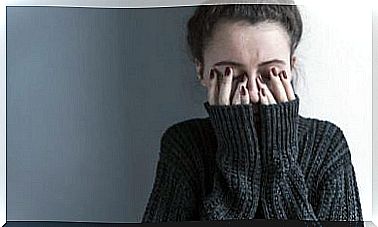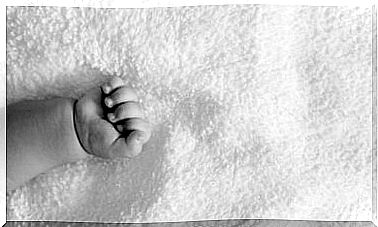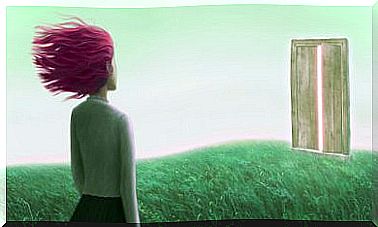The Book Thief, The Power Of Words
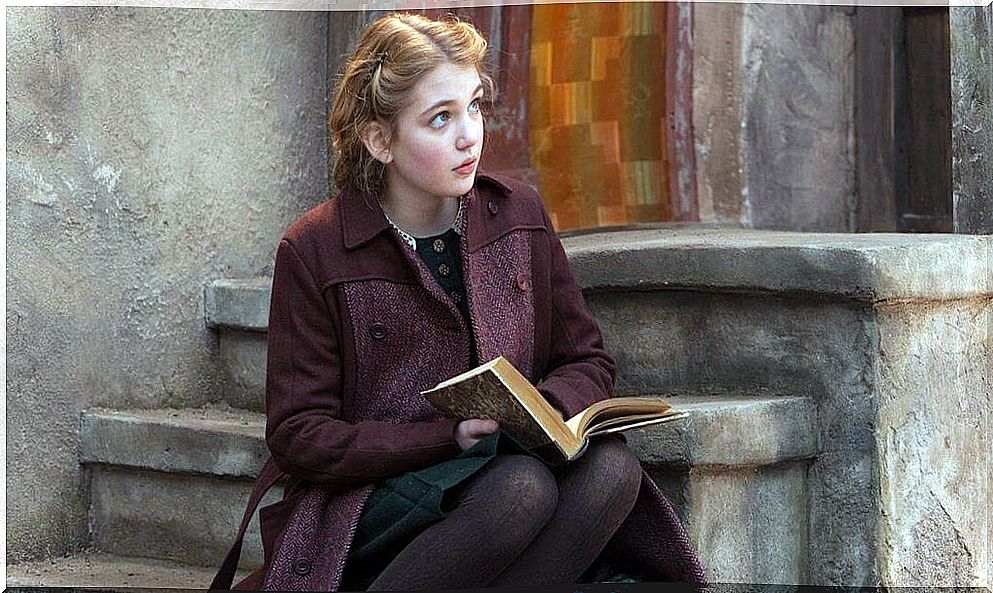
The Second World War is a scenario that the cinema has wanted to make the most of, it has been nourishing itself for decades and decades. Therefore, when they recommend another film on the subject, the feeling is tired.
It is not bad that these types of films continue to be made and, personally, I think it is interesting to talk about the past and keep it in mind, especially so as not to make the same mistakes. But laziness is understandable and, many times, we can. For this reason, when one is about to see The Book Thief (Brian Percival, 2013), based on the homonymous novel by Markus Zusak, at first, they think they are going to find “another drama of Nazism”.
But in the end, The Book Thief tells us something else (or, rather, someone else tells us), something that has to do with the present, the past and the future. This something is death, the death that awaits us all, that inevitable destiny that is always lurking. Is that this type of film can generate rejection by the tear, but The Book Thief , although it forces a scene, does not intend so much to make us cry, but to accept our end.
Another peculiarity is that neither we are in a concentration camp, nor does Hitler appear physically. Although we can perceive Hitler in the environment, as a threat; as an omnipresent, invisible and ruthless being. In this way, the film places us in daily life, in the life of the city whose inhabitants do not know very well what is going to happen and they try to continue with their lives as best they can. Everything is being written on the fly, the characters do not know their destiny.
Some will accept the rise of Nazism with resignation, others will welcome it. And, among the crowd, a girl will stand out whose life has been marked by misfortune: first, with the separation from her mother and, later, with the death of her brother.
Liesel, the girl, will be adopted by a rather older couple. At first, she will feel like a stranger, she will not hit it off with her mother, and she will not understand how the world works or why they hang the communist label on her. Through Liesel’s eyes and with the voice of death, we discover a story that oscillates between tale and reality, between life and death.
The book thief : read to escape
The Book Thief is not a must-see film and not one of the most praised of its genre. But it has an important message that refers us to the power of the word. The word is another great protagonist in the film, it is the escape route that the protagonists will find to survive in a horrible world. As we have advanced, the action takes place in the daily life, within the framework of the city, of the working-class families that Nazism has caught off guard.
Liesel arrives at her new home, she is just a child and has already lost the most important people in her life. He cannot read and, as a consequence, will be a source of ridicule at school. Liesel is also of communist origin so she will not escape that label either.
It is interesting to see how children repeat what adults say, even if they do not even know the meaning of the word. Some children will insult Liesel by shouting “communist,” but neither they nor Liesel really know what it means to be a communist.
The indoctrination at school is also evident, the children sing without knowing very well what the lyrics of the song hide. And here lies part of the message of the film: Liesel is labeled illiterate, but the other children, although they can read, do not know the meaning of many of the words that are part of their vocabulary. Is it only illiterate who cannot read?
At the beginning of the film, during her brother’s funeral, Liesel steals a book, a book of which she does not know its meaning, but for her it means a lot, it is a connection with her past, with her brother. His father will discover the book and teach him to read. The book, in reality, is not a novel or a story, it is a simple manual for gravediggers. Death, again, makes an appearance.
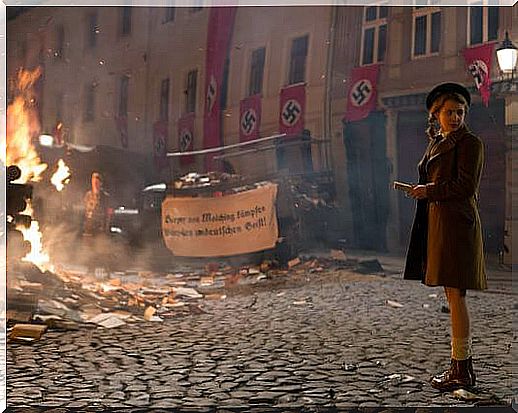
Liesel will find in books and words an important way to escape, to immerse herself in other worlds and to learn. Books can become a weapon, a way of thinking, for this reason, they were of no interest to Nazism. In a burning of immoral books, Liesel manages to rescue one, as it happens in Fahrenheit 451 ; but, here, we are not in a dystopia, we are in the real world, in a not so distant past.
This gesture is really meaningful, Liesel will share her love for books and words with her family and with Max, a young Jewish man who hides in Liesel’s family basement. Later, he will also share his secret with his friend Rudy and, somehow, with the mayor’s wife. The books allow Liesel to dream and Max to come out of hiding …
The true power of the word is manifested when the inhabitants of the city must hide in a bomb shelter while the city is bombed. At this moment, worry, fear and pain take over people. For this reason, Liesel decides to tell a story, to soak those frightened people in her love of words. And, without a doubt, it succeeds; tranquility returns to that dark place and words have defeated the bombs themselves.
No one escapes death
Somehow, the protagonists have two fears throughout the film: fear of death and fear of Hitler. Neither of the two figures appears physically, but we can perceive them. There’s a really interesting moment where Liesel and Rudy yell “I hate Hitler.” This cry supposes the loss of fear, there is no longer terror and they can accept what comes.
The same thing happens with death, Liesel has been aware of it since childhood, she has seen it everywhere, but her life has not stopped because of it. We are all going to die at some point, death is the only thing we have insurance from our birth and it does not understand money or borders.
Liesel dodges death on several occasions and the same happens to Max, who looked like he was going to be the first to die. Other characters will not have the same fate, but in the end, Liesel and Max will also have their time. Death stalks from the beginning of our lives.
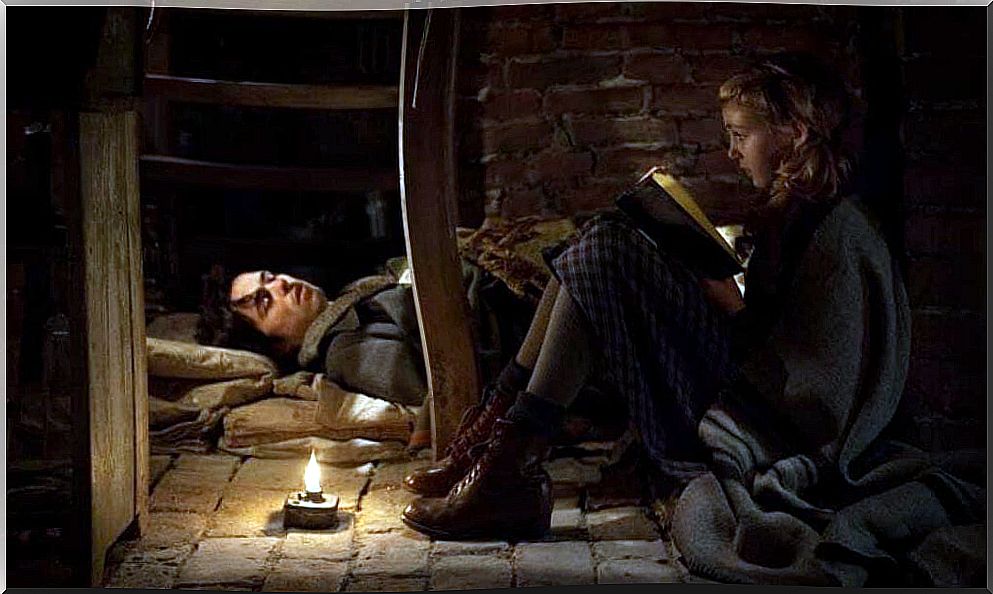
In The Book Thief , Death will comment on what we see, in a slow, calm voice. And it is that if we have to fear someone, we should fear the living. Even in the worst case scenario, Liesel finds room for optimism, as we see it in the hug with the mayor’s wife after the terrible bombing in which death has devastated almost all the inhabitants.
The voice- over is ironic in some points, but at the same time, it connects with the reality of its essence, of its nature. He also acts as a judge, balancing the scales, something that greatly reminds us of art and that topic of the memento mori. Death is a kind of vigilante, sometimes benevolent and sometimes ruthless, but it is not an enemy.
In this way, The Book Thief plunges us into a story full of humanity, friendship and learning in the middle of a horrible, dark and suffocating world. Of course, it is still a fantasy and does not have the impact of authentic stories like The Diary of Anne Frank , but it is a story, a pleasant story that reminds us that we must accept our destiny patiently and without fear.

